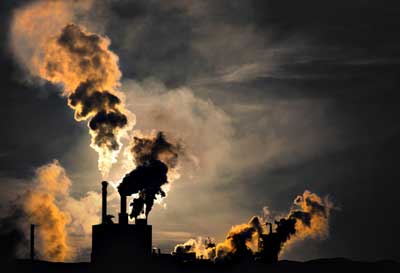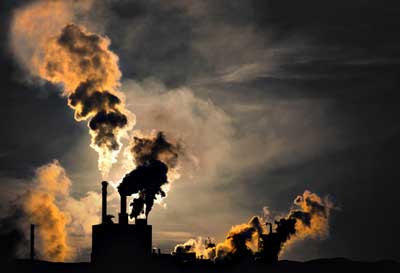
 (Image: Polluting factory via Shutterstock) The only thing more horrifying than rampant industrial pollution is pollution without consequences. Yet, companies across the globe freely dump toxic substances into the environment and get off with minimal punishments, sometimes even walking away from a pollution incident without being held accountable. That leaves residents, and governments, with the bill for cleaning up potentially life-threatening environmental pollution, a process that may take decades. Take a look at some of the worst offenders.
(Image: Polluting factory via Shutterstock) The only thing more horrifying than rampant industrial pollution is pollution without consequences. Yet, companies across the globe freely dump toxic substances into the environment and get off with minimal punishments, sometimes even walking away from a pollution incident without being held accountable. That leaves residents, and governments, with the bill for cleaning up potentially life-threatening environmental pollution, a process that may take decades. Take a look at some of the worst offenders.
1. Williams Energy
This company’s in the news this week thanks to a benzene spill near Parachute, Colorado. Williams processes fracked natural gas and managed to spill almost 250 barrels of mixed natural gas liquid, which inevitably made its way into the waterway. Two months later, residents are waiting for an explanation — and for punishments for Williams Energy. Lawmakers in the state have just addressed an outdated law capping fines at $10,000, but their actions are meaningless unless the state is ready to take action and actually levy those fines.
2. Northrop Grumman
The aerospace giant generates tremendous amounts of pollution in the course of its daily operations, including at a now abandoned facility in Calverton, New York. As is often the case with industrial pollution, initial evaluations of the site indicated something was going wrong, but now public health officials are realizing that the size of the company’s pollution plume may be much larger than previously estimated. Volatile organic compounds are saturating the groundwater, and no matter how wide and deep officials drill in search of clean water, they’re turning up more pollution. The Navy’s responsible for the cleanup bill here, but Northrop’s operations certainly haven’t been limited to this site.
3. General Electric
It took 30 years, but GE is finally being called to task for its extensive pollution of the Hudson River. The fight over GE’s pollution was one of the seminal battles of the environmental movement, pulling together activists who used a variety of organizing tactics to force the company to take responsibility. Now, that victory is already ringing bittersweet, as the EPA is in the process of relaxing the cleanup requirements, relieving responsibilities for GE without ensuring the river will be safely restored.
4. Dow Chemical
Dow’s polluting activities are legendary — this is the firm behind the horrific Bhopal disaster, for example. But the company is spewing dioxins in waterways, among many other pollution offenses, and regulators seem to be prepared to allow that to keep happening. In fact, the Supreme Court granted Dow what amounts to a free license to pollute despite objections from activists, pollution victims and environmental defense organizations. Institutional support for polluters makes it hard for citizens to fight them, let alone hold them accountable.
5. Rio Tinto
This Australian company’s so infamous, its polluting activities have actually inspired a campaign, No Dirty Gold, centered around cleaning up the mining industry and getting consumers involved in anti-pollution work. Across the world, Rio Tinto is polluting communities with toxic chemicals used in metals extraction and processing, in addition to engaging in blatant human rights violations, particularly in the Global South. Yet, the company remains a powerhouse in the industry, in no small part thanks to relief from fines and regulation provided by friendly politicians.
6. Koch Industries
Seeing this firm on the list probably won’t surprise you, and it might not shock you that this firm is very good at using its lobbying skills to dodge pollution fines. Koch Industries isn’t afraid of throwing its weight around to have fines reduced or rescinded, even as it cuts a swath of pollution across the U.S. At the same, the Koch family is extending its reach into a wide variety of markets and industries including newspapers, making it harder for ordinary citizens to understand the full extent of its polluting activities, human rights violations and abuses of power, because it controls the source of information and exchange in some communities.
7. U.S. Steel
When pollution is effectively your business, you tend to argue against limitations on pollution across your working area, especially state-mandated limits on individual pollution. U.S. Steel has been fighting attempts to regulate pollution in several states, including Indiana, where environment advocates have called for a crackdown on the company’s operations. They note that allowing U.S. Steel to continue discharging harmful materials like mercury into the Great Lakes causes tremendous environmental harm, and it has had ample opportunities to clean up its act on its own: it’s time for the company to get serious.
Want to see some more heavy polluters? The Political Economy Research Institute at the University of Massachusetts generates an annual “Toxic 100” list with details on major sources of pollution. You might find it a helpful consumer guide as well as an eye-opening look at the state of pollution in the U.S. and around the world.
Thank you for reading Truthout. Before you leave, we must appeal for your support.
Truthout is unlike most news publications; we’re nonprofit, independent, and free of corporate funding. Because of this, we can publish the boldly honest journalism you see from us – stories about and by grassroots activists, reports from the frontlines of social movements, and unapologetic critiques of the systemic forces that shape all of our lives.
Monied interests prevent other publications from confronting the worst injustices in our world. But Truthout remains a haven for transformative journalism in pursuit of justice.
We simply cannot do this without support from our readers. At this time, we’re appealing to add 50 monthly donors in the next 2 days. If you can, please make a tax-deductible one-time or monthly gift today.